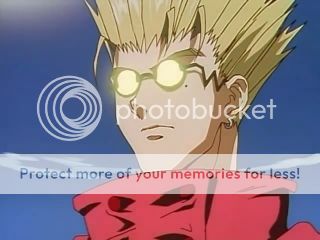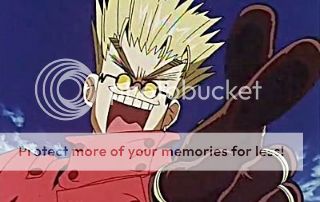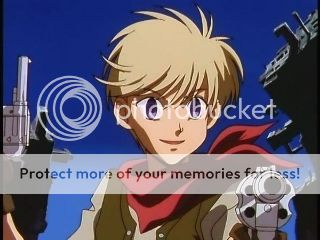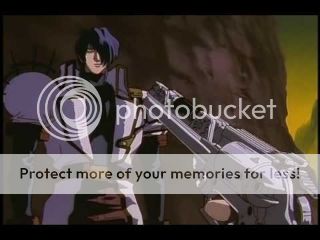7 Lessons to Take from Trigun
This is Vash the Stampede, aka “The Humanoid Typhoon with a $$60,000,000,000 bounty on his head”:
He may not look it, but Vash is also a peaceful soul, both literally and figuratively. Literally, in that he’s childish, playful and loves helping others. Figuratively, in that he’s a pacifist who goes extremes lengths to make sure no one dies on his watch. His story, therefore, tries to reconcile his beliefs with reality.
We can spend forever arguing about this show. We can argue whether or not it’s any good. We can argue whether or not it’s paced properly. We can argue whether or not its comedy conflicts with its drama. We can argue whether or not its writing makes sense, or its animation is good. We can even argue whether or not it’s stood the test of time.
But that’s not what I’m interested in. I think it’s more important that we stop and think about what Trigun represents. And so, here are 7 lessons I think are worth gleaming from the show, based solely on what Vash himself represents:
1. Appearances can be deceiving:
And yet, that’s what he is. Sure, he looks scary, but Vash is as caring and loving as they get. He even goes out of his way to bring back hope to those around him, a fact Meryl mentions in one of her insurance reports. Like John Coffey from The Green Mile, Vash’s biggest strength isn’t his size, but his heart. He’ll go out of his way to love even his enemies, regardless of whether or not they want that. And if they don’t? Well, he’ll still love them anyway.
The message here is that appearance has little to do with reality. Because first-impressions can be misleading. I’ve met plenty of cold individuals at first-glance who turned out to be really warm and caring, as well as plenty of warm individuals at first-glance who turned out to be cold and unsympathetic. It didn’t matter size, age, gender, or anything of that sort: the real test was taking my time to know them. And with Vash, whom we spend 26 episodes getting to know, it makes all the difference…even if he’s too warm for his own good.
2. Sticking to an ideal can be really challenging:
As we find out throughout the series, Vash makes sure this guiding principle is kept not only by himself, but also those around him. If you raise a gun at someone, he’ll take it from you. If you attack someone, he’ll intervene. The reasons for why he lives this way might be simplistic, he’s honouring the beliefs of a dead friend, but that he sticks to his ideals is enough to drive you crazy. And for many of the people he meets, it does.
But you know something? I admire that. The world is filled with so many injustices and temptations that sticking to your beliefs, as idealistic as they may be, is quite admirable. Is it easy? No, but mantras are never easy to stick to. Still, if someone like Vash, who embodies pacifism, can stick to his beliefs in spite of the horrors he faces, well…he’s earned my respect.
3. Never be afraid to trust the people you care about:
This speaks to me personally, especially as someone who hides from his fears because I don’t want trouble. I’m also hesitant to really meet new people, as I’m afraid of what’ll happen if I do. And whenever there’s conflict, I dodge it for fear of losing control. But Vash argues that that’s not healthy. Because the healing process can only begin with those you care about, as human beings are social animals.
Additionally, trusting means being open about your problems. Remember the saying, “Secrets, secrets are no fun”? It’s true, especially in fiction. It’s something Vash is frequently guilty of, and while it helps with the mystery of it all, in the end it’s only through being open and honest that he can be at peace. Only once Vash begins trusting others does he slowly put his demons to rest…even at the expense of sacrificing some of his beliefs.
4. In order to make an omelette, you must crack a few eggs:
If Trigun’s anything to go by, it’s that that’s an impossible ideal to live by. Because if you’re not standing up for something important without making a few enemies, then you’re doing it wrong. People are stubborn and resistant to what’s difficult and scary all the time. And yes, the consequences are painful, there’s no denying that. In the case of Vash, his injuries and scars even speak for themselves! But if it’s really worth fighting, then it doesn’t matter what the short-term consequences are.
Ultimately, if there’s another sub-lesson to gleam here, it’s that inadequacy is normal. Many times throughout the course of Trigun, Vash actually feels like giving up. Either the cost of his quest is too high, the damage gets to him, or he doesn’t know how to proceed. And yet, he’s always reminded that his efforts aren’t in vain through someone who’s impacted by him. Sure, he makes more enemies each time he bounces back, causing the cycle to continue, but isn’t that little difference worth it?
5. Compassion for others doesn’t make you weak:
That sounds nice in theory, but it’s absolute malarky in practice. Interacting with people is natural and healthy. Interacting with them positively is doubly so. But, most importantly, caring about them makes you stronger. Sure, it might seem childish to cry over someone else’s pain, but is it really? Does caring for others lessen who you are, or does the fact that others know you care comfort them and, ultimately, you? If Vash is indication, the answer is clearly the latter.
Additionally, Trigun makes the case that being involved doesn’t make you any less of a role model. Far too often, we mistake our heroes for people who are constantly cold and rational, leaving no room for attachment or emotion. Vash, once again, proves that notion false. Because while he’s whiney and over-emotional, he’s also awesome and worthy of being a real leader. In other words, it’s the humanity of people that makes them worth following, not the strength or power they have. Not to say the latter can’t help, but…you know…
6. Sometimes, it’s important to know when to pull the trigger:
It doesn’t even have to be a literal trigger. Vash might’ve been forced to shoot Legato, but that struggle can apply to knowing when to sever relationships. Because it’s difficult to know when to do it sometimes. Does it mean we should always pull the trigger when the situation gets too tough? Not necessarily, there are usually alternatives out there. But the option should still be considered.
Not to mention, that Vash is torn up by his decision is something we also can learn from. Because pulling that trigger is never easy. At the same time, however, we should keep moving forward. If anything, it should give us the incentive to do so. After all, if we don’t move forward, then how are we supposed to grow? What’s the point if you’re too fixated on your mistakes and regrets?
7. Above all else, never lose hope in humanity:
This one’s especially important because we live in an imperfect world. Humans murder other humans, theft and rape are rampant, and all kinds of unspeakable acts are committed each day. It often seems like believing in humanity is impossible, and at times that might be true. But we should never give up. In fact, the second we give up hope for a better tomorrow, then everything is doomed.
Perhaps the best way to understand is through Rem Saverem’s haunting tune. True, it’s a religious elegy about how the world came to be, but it also highlights the reality that is humanity. The world was made for us, so we should cherish and respect what it has to offer, including our fellow man. And how do we do that? By hoping for the best in them.
In conclusion, we should strive to be like Vash and learn from Trigun…except for how being a womanizer is funny, because that’s kinda creepy. See you all next time!









Comments
Post a Comment